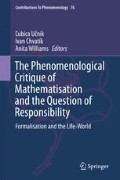Abstract
In my paper, I do not follow the well-known story of how Husserl wanted to solve the crisis of mankind by his transcendental phenomenology. Neither do I analyse Heidegger ’s views on the danger of science and technology. Rather, I examine a new book by renowned physicist Stephen Hawking and his colleague Leonard Mlodinow, to see how they reflect on this situation today. Although I accept their method of a “model-dependent realism”, I cannot agree with their arrogant formulation of a purely deterministic physical concept of the universe, and I strongly refute their conviction that human beings are merely deterministic robots without free will .
Access this chapter
Tax calculation will be finalised at checkout
Purchases are for personal use only
Notes
- 1.
German edition: Die Krisis der europäischen Wissenschaften und die transzendentale Phӓnomenologie (Husserl 1954).
- 2.
Translation: Erika Abrams.
- 3.
Czech edition: Kacířské Eseje o Filosofii Dějin (Patočka 2007).
- 4.
“All men by nature desire to know” (Aristotle 1941: I, 1, 980 a 921).
- 5.
“…what is being, i.e. what is substance?” (Aristotle 1941: VII, 1, 1028 b 1024).
- 6.
“Pourquoi il y a plutôt quelque chose que rien?”; “Why is there something rather than nothing?” (Leibniz 1934 [1714]: §7, 26).
References
Aristotle. 1941. Metaphysica. In The Basic Works of Aristotle, Trans. W. D. Ross. ed. Richard McKeon, 681–926. The Random House Lifetime Library. New York: Random House.
Hawking, Stephen, and Leonard Mlodinow. 2010. The Grand Design. London: Bantam Press.
Husserl, Edmund. 1954. Die Krisis der europäischen Wissenschaften und die transzendentale Phӓnomenologie: Eine Einleitung in die phänomenologische Philosophie, Husserliana, vol. VI, ed. Walter Biemel. The Hague: Nijhoff.
Husserl, Edmund. 1970. The Crisis of European Sciences and Transcendental Phenomenology: An Introduction to Phenomenological Philosophy. Trans. David Carr. Northwestern University Studies in Phenomenology & Existential Philosophy. Evanston: Northwest University Press.
Leibniz, Gottfried Wilhelm. 1934 [1714]. Principles of nature and grace, founded on reason. In Philosophical Writings, Trans. Mary Morris, 21–31. London/New York: J. M. Dent and Sons and E. P. Dutton and Co.
Patočka, Jan. 1996. Heretical Essays in the Philosophy of History. Trans. Erazim Kohák. Chicago/La Salle: Open Court.
Patočka, Jan. 2007. Kacířské eseje o filosofii dějin [Heretical Essays in the Phisosophy of History], Third corrected Ed. Edice Oikúmené. Praha: OIKOYMENH.
Patočka, Jan. 2008 [1936]. Přirozený Svět Jako Filosofický Problém [The natural world as a philosophical problem]. In Fenomenologické Spisy I: Přirozený Svět. Texty z Let 1931–1949, Sebrané Spisy Jana Patočky. Svazek 6, ed. Ivan Chvatík and Jan Frei, 127–260. Praha: OIKOYMENH.
Shakespeare, William. 1975. King Lear. In The complete works, 973–1009. New York: Avenel Books.
Author information
Authors and Affiliations
Corresponding author
Editor information
Editors and Affiliations
Rights and permissions
Copyright information
© 2015 Springer International Publishing Switzerland
About this chapter
Cite this chapter
Chvatík, I. (2015). Are We Still Afraid of Science?. In: Učník, Ľ., Chvatík, I., Williams, A. (eds) The Phenomenological Critique of Mathematisation and the Question of Responsibility. Contributions To Phenomenology, vol 76. Springer, Cham. https://doi.org/10.1007/978-3-319-09828-9_14
Download citation
DOI: https://doi.org/10.1007/978-3-319-09828-9_14
Published:
Publisher Name: Springer, Cham
Print ISBN: 978-3-319-09827-2
Online ISBN: 978-3-319-09828-9
eBook Packages: Humanities, Social Sciences and LawPhilosophy and Religion (R0)

